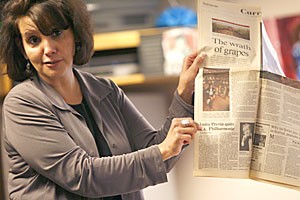A week dedicated to the life and mission of the late Cesar Chávez began yesterday with an hour-long talk remembering his legacy and vision of collaboration.
The speech was delivered by Olga Briseno, director of the Media, Democracy and Policy Initiative, and Anna O’Leary, a professor in Mexican American Studies.
“”I think Cesar Chávez was really important in giving us a perspective that was really a jump start in looking at social justice,”” said O’Leary, who is also a current Fulbright Scholar.
During his life, Chávez was an instrumental civil rights activist who co-founded the National Farm Workers Association, which helped improve conditions for many migrant workers. The Cesar E. Chávez building, 1110 E. James E. Rogers Way, was dedicated to him in 2003 for his influential work with civil rights.
O’Leary spoke about the importance of remembering that a collective and collaborative approach is what makes change effective in our society.
“”The collective approach stands in contrast to the American approach, which says, ‘If you don’t make it in this society, it’s your fault,’ “” O’Leary said. “”We get seduced by the ‘every man for himself’ idea and Chávez showed us that coming together as a population works better.””
O’Leary said that collaboration is an important Mexican-American value that was important to Chávez and his work.
“”To me that is a really important principle that we forget about,”” O’Leary said.
Briseno said she would like to see Chávez’s name in the same group as other social disobedience leaders such as Henry David Thoreau,
Mohandas Gandhi and Martin Luther King Jr.
“”As we learn to organize and we decide that there is something that we don’t like, we need to think ‘OK, what can we do to organize?’ “” Briseno said.
“”Cesar was amazing at organization.””
Briseno interviewed Chávez many times during her work as a journalist and said something he would want everyone to remember is not what he did, but what everyone else has done as a result of cooperation and determination.
“”That is my mission – that my children can open a history book and read about how we were a part of American history,”” Briseno said.
Speakers will be sharing their thoughts on various topics such as themed parties and social injustices against Mexican Americans all week long from noon to 1 p.m. in the Cesar E. Chávez building, Room 211.
On Friday from 2 p.m. to 5 p.m., the Latino Law Student Association will present Dolores Huerta, a prominent Chicana labor leader and social activist, and Antonio Bustamante, attorney and former bodyguard to Chávez, to speak at the James E. Rogers College of Law.
A CǸsar Chávez march is also planned for Saturday at 9 a.m.
To R.S.V.P. for this event, call 626-1300 or e-mail jonelle.vold@law.arizona.edu.









